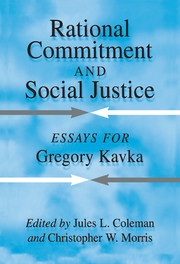Book contents
- Frontmatter
- Contents
- Acknowledgments
- List of Contributors
- Introduction: The Moral and Political Philosophy of Gregory Kavka
- Some Personal Memories
- The Shadow of the Future
- A New Paradox of Deterrence
- Rethinking the Toxin Puzzle
- Toxin, Temptation, and the Stability of Intention
- The Toxin Puzzle
- Religion and Morality in Hobbes
- Contemporary Uses of Hobbes's Political Philosophy
- The Knavish Humean
- Some Considerations in Favor of Contractualism
- Justice, Reasons, and Moral Standing
- Wrongful Life: Paradoxes in the Morality of Causing People to Exist
- Gregory S. Kavka's Writings
Rethinking the Toxin Puzzle
Published online by Cambridge University Press: 28 October 2009
- Frontmatter
- Contents
- Acknowledgments
- List of Contributors
- Introduction: The Moral and Political Philosophy of Gregory Kavka
- Some Personal Memories
- The Shadow of the Future
- A New Paradox of Deterrence
- Rethinking the Toxin Puzzle
- Toxin, Temptation, and the Stability of Intention
- The Toxin Puzzle
- Religion and Morality in Hobbes
- Contemporary Uses of Hobbes's Political Philosophy
- The Knavish Humean
- Some Considerations in Favor of Contractualism
- Justice, Reasons, and Moral Standing
- Wrongful Life: Paradoxes in the Morality of Causing People to Exist
- Gregory S. Kavka's Writings
Summary
“As our beliefs are constrained by our evidence, so our intentions are constrained by our reasons for action.” With Gregory Kavka's conclusion to “The Toxin Puzzle” I have no quarrel. As a rational person, I can intend only what I expect to have reason to do. What follows from this? Kavka notes that “we are inclined to evaluate the rationality of the intention both in terms of its consequences and in terms of the rationality of the intended action” (p. 36). Combining his conclusion with his claim about evaluation, we should infer that an intention is rational if and only if it is directed at an action that would be rational and no alternative intention directed at an action that would be rational has more favorable consequences. And with this I have no quarrel. But we could easily be misled by the way in which I have expressed this inference. For we could suppose that whether an intended action is rational can be determined independently of and prior to considering whether the intention to perform that action has best consequences. And this I deny.
Consider the toxin puzzle. I shall be paid “one million dollars tomorrow morning if, at midnight tonight, [I] intend to drink” a vial of “toxin tomorrow afternoon” that “will make [me] painfully ill for a day, but will not threaten [my] life or have any lasting effects” (p. 33).
- Type
- Chapter
- Information
- Rational Commitment and Social JusticeEssays for Gregory Kavka, pp. 47 - 58Publisher: Cambridge University PressPrint publication year: 1998
- 15
- Cited by



